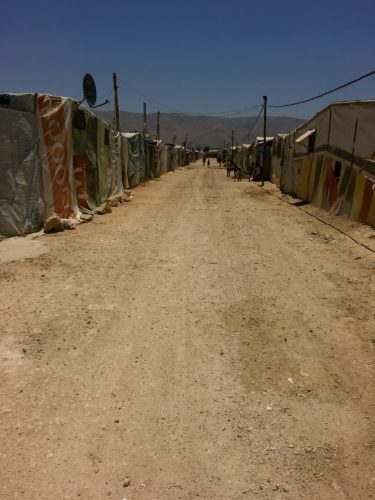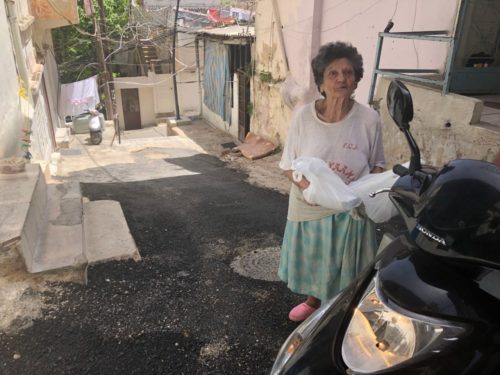 There are currently 28 Syrian refugee teachers at the tent schools we support for refugee children in Lebanon. These people are trained up from within the refugee camps and they not only teach, but are a source of help and advice for parents and the wider community. They are a force for good despite living in a situation completely out of their control.
“The teachers here speak the same dialect of Arabic as their students (often they’re from the same or the neighbouring camp as the children), they get their culture, so nothing gets by them. The teachers are motivated to learn, motivated to be useful, and motivated to be a changing force in their communities.” Nadine – School’s Co-ordinator
The teachers are creating a strong community atmosphere within the settlements and many are looked upon as leaders. These strong relationships between the parents, teachers and other adults in the communities are leading to higher than average attendance and retention rates within the schools. Teachers engage parents in education and to help them to understand the long term benefits for the children.
We’d like to introduce you to four of these teachers, to give you an insight into their work and the amazing things they are achieving.
Halima
Halima is a teacher who has taught with us for two years now, and also works as a trainer. She describes her experience in the tent schools:
“Our work is very focused. We work wholesomely, not just to educate the kids but to help them grow into better, more well rounded people. It’s also been really good to learn how to support our student’s growth in learning not to physically abuse each other, and learning about therapeutic methods to deal with what the kids have seen in war; learning about forgiveness.
I’ve gained so much experience, and this job has encouraged me to grow not just as a teacher but also in my passions. I write stories and songs and poetry and use them to give the children more fun, creative resources to learn. As not just a teacher but also a mother to one of the students, I’m so glad that my son can read and write well, especially when I hear about other schools poor levels of education. I really like that we teach the children to make conclusions instead of pointing everything out to them”.
Mariam
The teachers are regularly observed by our experienced teacher trainer whilst teaching a range of lessons and they receive constructive feedback. They are given time to meet and work with colleagues to plan and evaluate sessions and to share best practice. The class helper is also observed and they receive feedback to ensure they are able to enhance the teaching and learning and the overall classroom environment.
One of the newer teachers from the third school, Mariam said:
“It’s really amazing to see the change in our students compared to what they were like in the very beginning. Initially things were so rowdy, but now that some time has passed, they trust us more, they enjoy school and it’s made things better overall.”
Hala
Hala particularly likes the games and teaching methods used in the classes and the fact that the students have to discover the point of the lesson by themselves which gives them much more enjoyment. She likes that the teachers interact with the children and that the project and craft sessions regularly rotate, keeping the children interested.
“The teaching style brings out the best in the teachers” she explains “it brings out qualities which are hidden in the Syrian teaching system and strengthens the children’s personalities. In this school environment the children have no fear, they are comfortable and talk a lot. They have the courage to speak and play. They are happy in school and they go home happy. I haven’t met a child who doesn’t want to go to school, in fact many don’t want to go home at the end of the day”.
All the teachers are provided with all the materials and resources they need; many they make themselves. Hala enjoys encouraging the children’s creative gifts and feels that through this the children become happy, encouraged and have motivation for life.
“They gain courage to try new things. The children in my class want to be doctors and pilots and some of the girls want to be princesses!” she laughs, “We have some work to do on that one!”.
Omad
Omad finished his university degree in Syria and taught grade 9 science for a year before he had to leave for Lebanon. He has been in Lebanon for over 3 years and had found work in a factory. He now also works for the school 3 days a week, but has to continue working in the factory to support his income.
He loves teaching and said that ‘if I didn’t like it, I wouldn’t do it!’. He has enjoyed learning the new child-friendly methods of teaching and use of resources. He described how learning to teach in the camp schools and teaching in Syria is very different, the Syrian schools he has worked in have a frozen style of teaching and use rote learning.
He says, “At first when I was asked to attend the teacher training I was offended. I felt I did not need training as I already had my teaching qualifications. However I found the training really useful and learnt a lot of new things about how to involve the children and use resources to help them to learn in a fun way using games and jokes”.
The Syrian refugees we train as teachers for our camp schools in Lebanon receive a regular, reliable income which allows them to care and provide for their families. They all receive training and support to build their knowledge and teaching skills, enabling them to excel in their field. They will also be able to use these transferable skills in the future and are constantly learning from each other and developing their practice.
There are currently 28 Syrian refugee teachers at the tent schools we support for refugee children in Lebanon. These people are trained up from within the refugee camps and they not only teach, but are a source of help and advice for parents and the wider community. They are a force for good despite living in a situation completely out of their control.
“The teachers here speak the same dialect of Arabic as their students (often they’re from the same or the neighbouring camp as the children), they get their culture, so nothing gets by them. The teachers are motivated to learn, motivated to be useful, and motivated to be a changing force in their communities.” Nadine – School’s Co-ordinator
The teachers are creating a strong community atmosphere within the settlements and many are looked upon as leaders. These strong relationships between the parents, teachers and other adults in the communities are leading to higher than average attendance and retention rates within the schools. Teachers engage parents in education and to help them to understand the long term benefits for the children.
We’d like to introduce you to four of these teachers, to give you an insight into their work and the amazing things they are achieving.
Halima
Halima is a teacher who has taught with us for two years now, and also works as a trainer. She describes her experience in the tent schools:
“Our work is very focused. We work wholesomely, not just to educate the kids but to help them grow into better, more well rounded people. It’s also been really good to learn how to support our student’s growth in learning not to physically abuse each other, and learning about therapeutic methods to deal with what the kids have seen in war; learning about forgiveness.
I’ve gained so much experience, and this job has encouraged me to grow not just as a teacher but also in my passions. I write stories and songs and poetry and use them to give the children more fun, creative resources to learn. As not just a teacher but also a mother to one of the students, I’m so glad that my son can read and write well, especially when I hear about other schools poor levels of education. I really like that we teach the children to make conclusions instead of pointing everything out to them”.
Mariam
The teachers are regularly observed by our experienced teacher trainer whilst teaching a range of lessons and they receive constructive feedback. They are given time to meet and work with colleagues to plan and evaluate sessions and to share best practice. The class helper is also observed and they receive feedback to ensure they are able to enhance the teaching and learning and the overall classroom environment.
One of the newer teachers from the third school, Mariam said:
“It’s really amazing to see the change in our students compared to what they were like in the very beginning. Initially things were so rowdy, but now that some time has passed, they trust us more, they enjoy school and it’s made things better overall.”
Hala
Hala particularly likes the games and teaching methods used in the classes and the fact that the students have to discover the point of the lesson by themselves which gives them much more enjoyment. She likes that the teachers interact with the children and that the project and craft sessions regularly rotate, keeping the children interested.
“The teaching style brings out the best in the teachers” she explains “it brings out qualities which are hidden in the Syrian teaching system and strengthens the children’s personalities. In this school environment the children have no fear, they are comfortable and talk a lot. They have the courage to speak and play. They are happy in school and they go home happy. I haven’t met a child who doesn’t want to go to school, in fact many don’t want to go home at the end of the day”.
All the teachers are provided with all the materials and resources they need; many they make themselves. Hala enjoys encouraging the children’s creative gifts and feels that through this the children become happy, encouraged and have motivation for life.
“They gain courage to try new things. The children in my class want to be doctors and pilots and some of the girls want to be princesses!” she laughs, “We have some work to do on that one!”.
Omad
Omad finished his university degree in Syria and taught grade 9 science for a year before he had to leave for Lebanon. He has been in Lebanon for over 3 years and had found work in a factory. He now also works for the school 3 days a week, but has to continue working in the factory to support his income.
He loves teaching and said that ‘if I didn’t like it, I wouldn’t do it!’. He has enjoyed learning the new child-friendly methods of teaching and use of resources. He described how learning to teach in the camp schools and teaching in Syria is very different, the Syrian schools he has worked in have a frozen style of teaching and use rote learning.
He says, “At first when I was asked to attend the teacher training I was offended. I felt I did not need training as I already had my teaching qualifications. However I found the training really useful and learnt a lot of new things about how to involve the children and use resources to help them to learn in a fun way using games and jokes”.
The Syrian refugees we train as teachers for our camp schools in Lebanon receive a regular, reliable income which allows them to care and provide for their families. They all receive training and support to build their knowledge and teaching skills, enabling them to excel in their field. They will also be able to use these transferable skills in the future and are constantly learning from each other and developing their practice.
0

 This woman *Maria* lives alone. Her husband died a while ago and she has no children. She is all alone. Her and her Ethiopian neighbor try to help each other. She is very old and lives on a large hill. After getting up the hill she needs to rest before taking the stairs into her house. She hoards trash, as throwing anything away when she has so little, seems like an overwhelming idea.
We also spoke to a man named *Youssef* He wears his jacket year round because He has no home to leave it in. His brother lets him stay inside at night, but not in his home, only in the staircase. He collects trash for the surrounding buildings and brings them to the dumpster to earn the small amount of cash that the residents give him.
There is a small shop that Triumphant Mercy hopes to make into a small coffee shop and a place to serve lunches in order to generate income to help fund the feeding of the poor. There is a university near by, and we hope that students will find it a place to get a quick lunch or a coffee knowing they are helping something bigger.
This woman *Maria* lives alone. Her husband died a while ago and she has no children. She is all alone. Her and her Ethiopian neighbor try to help each other. She is very old and lives on a large hill. After getting up the hill she needs to rest before taking the stairs into her house. She hoards trash, as throwing anything away when she has so little, seems like an overwhelming idea.
We also spoke to a man named *Youssef* He wears his jacket year round because He has no home to leave it in. His brother lets him stay inside at night, but not in his home, only in the staircase. He collects trash for the surrounding buildings and brings them to the dumpster to earn the small amount of cash that the residents give him.
There is a small shop that Triumphant Mercy hopes to make into a small coffee shop and a place to serve lunches in order to generate income to help fund the feeding of the poor. There is a university near by, and we hope that students will find it a place to get a quick lunch or a coffee knowing they are helping something bigger.